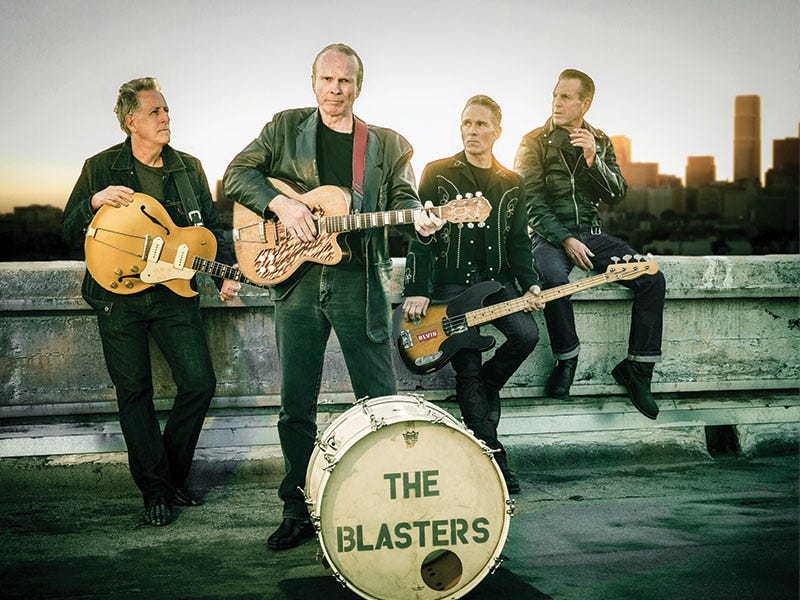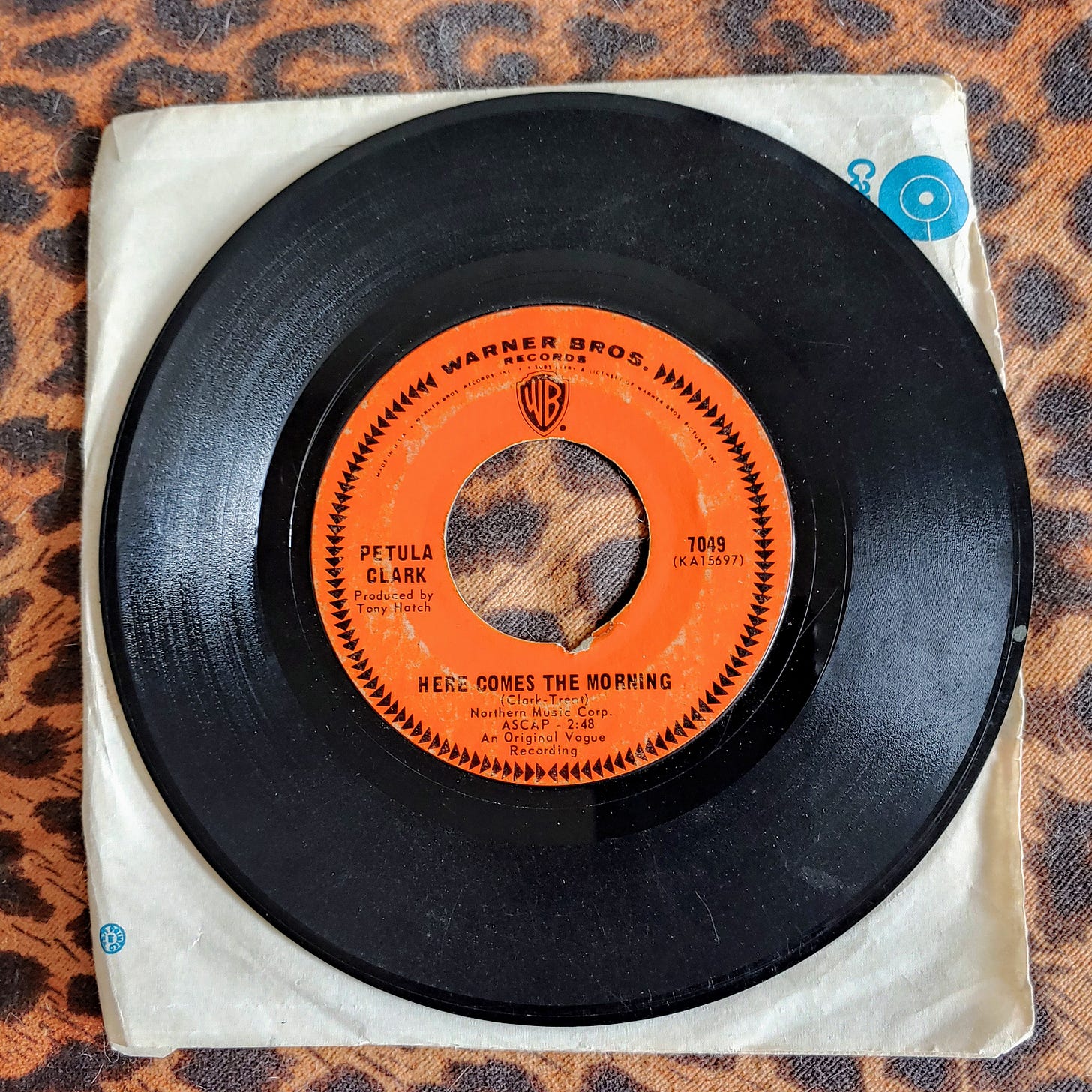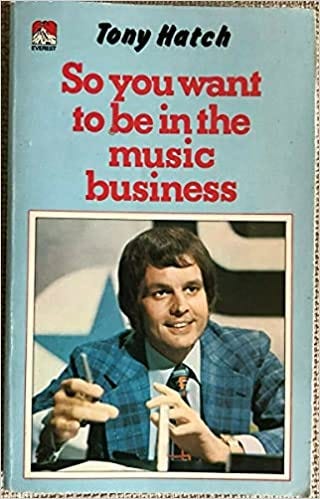NDIM 10/14/2021
Remembering The Blasters, Singles From the Archives: 'Don't Sleep In the Subway' by Petula Clark
They have never gotten the attention that they deserve, but Dave Alvin and The Blasters have kept their brand of American music alive and kicking.
Travel with me, kiddies, if you will, back to the magic days of 1980 Los Angeles when punk rock was king and the City of Angels gave birth to some of the best bands this country has raised since the mysterious Mississippi Delta produced the sweltering combo of blues, jazz, ragtime, show tunes, and country music known as rock and roll, spewing forth Jerry Lee Lewis, Little Richard, Johnny Cash, Elvis Presley, and many more. Sometime in the mid-'70s a bunch of music-crazed social outcasts in and around L.A. became infused with the DIY ethos of English punk rock and decided they could play whatever music they wanted, whatever they heard, whatever the hell impressed them rather than the bland crap the record labels wanted to put out (Michael Jackson, Culture Club, and all that wimpy synth stuff).
You had Midwestern refugees John Doe and Exene Cervenka turning their beat poetry and love of R&B, early rock, and religious imagery into the hellfire sound known as X, you had a bunch of guys in East L.A. who had been performing traditional Mexican folk music at weddings and such beginning to write their own songs influenced by the same energy and rock ethos that had made Richie Valens a rock star decades earlier. A raving poet named Chris D. pulled musicians from all these bands to create the Flesheaters, whose first records are the supergroup of L.A. punk. Later, the Cramps transplanted themselves and their peculiar brand of horror-film influenced rockabilly to L.A. as well. And, dig, this was all happening in what many had always been dismissed as America's cultural wasteland, Los Angeles.
These bands all managed to thrive on the L.A. scene and injected it with a legitimacy that made those looking for something new and interesting take notice. Though all these bands had a genuine interest in and love of early American rock, country, and R&B, few had studied the music as long or as hard as The Blasters. Brothers Dave and Phil Alvin had put in hard time combing record stores for rare 45 and 78 rpm records by musicians that had influenced other musicians that they idolized. Remember, kids, this was in the bad old days when there were no CD compilations of one-armed go-go dancing dwarf bands you could order online, nor was there peer-to-peer file sharing. No, in place of these things, there was something called community. You heard a great band and told anyone who would listen "check them out." And lo and behold, many of your friends would check this band out and they would love them or hate them, and they would tell people. It wasn't even known as viral marketing back then. And, oh yeah, we were trading cassette tapes as well.
When Slash Records released The Blasters nationally it was a revelation for many listeners. Here was a band clearly in touch with rockabilly, country, blues, and New Orleans roadhouse R&B, but who didn't slavishly imitate anything or anyone. They wrote their own songs and those songs stood up well to the influences from whence they sprang. Pianist Gene Taylor could play Professor Longhair boogie with complete authenticity and saxophonists Steve Berlin and Lee Allen created a pile-driving R&B mystery train that chugged along in a way no rock band at the time could match. Dave Alvin originals like "Marie Marie", "Border Radio", "American Music", and "Hollywood Bed" paid tribute to the roots of America's music without in any way coming across as a pale imitation. Time magazine declared the album one of the year's 10 best. The Blasters hit London for live shows where the EP Over There was recorded. Here the Blasters proved that they could perform covers with just as much energy and render them current and vital. Jerry Lee Louis' "High School Confidential", The Collins Kids' "Rock Boppin' Baby", Roy Orbison's "Go, Go, Go", Big Joe Turner's "Roll "Em Pete";what other band, save perhaps Slash labelmates Los Lobos could even contemplate performing such material and not sounding pathetic?
The Blasters returned home and recorded their second album, Non Fiction, released in 1983. It sported more incredible songwriting from Alvin, who was writing as well as Robbie Robertson had during The Band's formative years up in Woodstock—"Red Rose", "Jubilee Train", "Long White Cadillac", and "Flat Top Joint". The critics were unanimous in their praise. One problem, though: the record industry had already found its rockabilly band, the cartoonish Stray Cats who were all over new tastemaker MTV. The original Blasters lineup released their final album, Hard Line, in 1985, and it was every bit as good as its predecessors, even though Dave Alvin was writing in a wider array of styles than previously. There was more gospel and country, plus horns. But the same early rock influences that had propelled the group was still there as well, on "Little Honey" and the shimmering, threatening "Dark Night." The group did a cover of the traditional "Samson and Delilah" that showed up the incredible shallowness of the Grateful Dead's popular cover of the song as well.
Dave Alvin continues to write great songs and perform with his band The Guilty Men, and anyone who has seen one of their shows can tell you that he is still as capable of connecting with an audience as ever. Phil recorded a couple of really great albums and put together another version of The Blasters as well. All great, but not quite the same.
The story has something of a happy ending, though: you can get the entire output of the original Blasters on a two CD compilation entitled Testament. Yep, all three albums and the Over There EP can be yours for less than a date at the movies with popcorn and candy will cost ya. You won't even have to wade through the old 45 and 78 bins. More's the pity.
Singles from the archives
Periodically I am going to delve into my grab bag of 7" 45rpm (and occasionally 33.3rpm) records and write about that record...What it is, where it came from, when I got it, what the song means to me, connections that it makes for me, memories associated with it--that sort of thing. I am going to select records randomly to post, just pulling something out of the stack.
It'll be a pretty random grab bag of stuff, but most of my 45s come from a few periods of my life:
I have a core group of 45rpm singles and EPs that were passed down to me and had been my mother's, mostly, though a few came via other family members.
During my youth I purchased a single a couple of times a month, maybe weekly, at the local TurnStyle. These were all records I heard on AM Top 40 radio stations like WCFL and WLS in Chicago. That lasted from maybe age eight or so until I was maybe thirteen, by which time I really only purchased albums.
During my college years, beginning around 1980, I started buying singles again because I followed the punk rock/new wave scene, and many bands released multiple singles prior to an album, much as it had been during the early years of rock, pre-Beatles, though they were still a singles band for much of their career. There were also cool one offs, like the four tracks of Elvis Costello & the Attractions Live at Hollywood High that came as a bonus 7" EP with Armed Forces, or the 7" Nick Lowe & Dave Edmunds Sing the Everly Brothers that came with Rockpile's album.
I went through a spell of buying 45s I saw in thrift stores and garage sales for a buck or less ,even if their condition wasn't great. That was maybe '85 through about '92. After that I really didn't buy any 7" records or add to my collection.
Don't Sleep In the Subway/Here Comes The Morning--Petula Clark (1967)
I don't remember where I bought this, but it came from Era 4 so it must have been cheap. I bought it because it was a top sixties pop song and it was Petula Clark, but I also bought it because it was a record produced by Tony Hatch and co-written by Hatch and soon-to-be-wife, songwriter Jackie Trent. Hatch's greatest claim to fame is undoubtedly that he single-handedly wrote Petula Clark's massive hit "Downtown," though he wrote other songs with a variety of partners until his collaboration with Jackie Trent.
The thing that made Hatch known to me was that he had written a paperback book entitled So You Want to Be In The Music Business that I purchased and read cover to cover. My copy may still be around, lurking in some cardboard boxes, stowed away in the remote edges of the house, or I may finally have pitched it one day. The book was nothing out of the ordinary, really, a lot of Hatch's advice (if he did pen it himself) that ran along the lines of ordinary common sense.
So, yes I was happy to snap up a copy of this 45rpm record for probably a dollar or less. I love the record's structure as well--a standard pop verse that leads to a dramatic section ("Goodbye means nothing when it's all for show...") with sweeping strings courtesy of Hatch's orchestration, and then the payoff sixties pop chorus.
The B Side, "Here Comes The Morning" is a sitting at the kitchen table with a cup of coffee after the breakup kind of song, full of loneliness and introspection. It's downbeat and mellow, though it still gets the sumptuous string arrangement. The song is credited to Clark and Trent, which is odd. Clark is known to have written and co-written a number of songs, but in her posthumously published autobiography Jackie Trent states that Clark was 'a cold fish' to her despite her attempts to befriend the singer. In fact, she states that hubby Hatch persuaded her not to let Petula know that she was writing the lyrics to some of the songs she was recordinTg because of their animosity. Of course, that was good business because the royalty checks were landing in the Hatch/Trent family bank accounts.
Lagniappe
Here’s Tanya Donelly doing a nice cover of The Pixies’ “Here Comes Your Man” as part of her Sunday Series of covers for fundraising. Check out her Bandcamp page for more info.
Thank for subscribing and reading. Please recommend NDIM to your friends. Eat your vegetables. And do something you enjoy today, even if it’s only for a few minutes.
See you soon.







